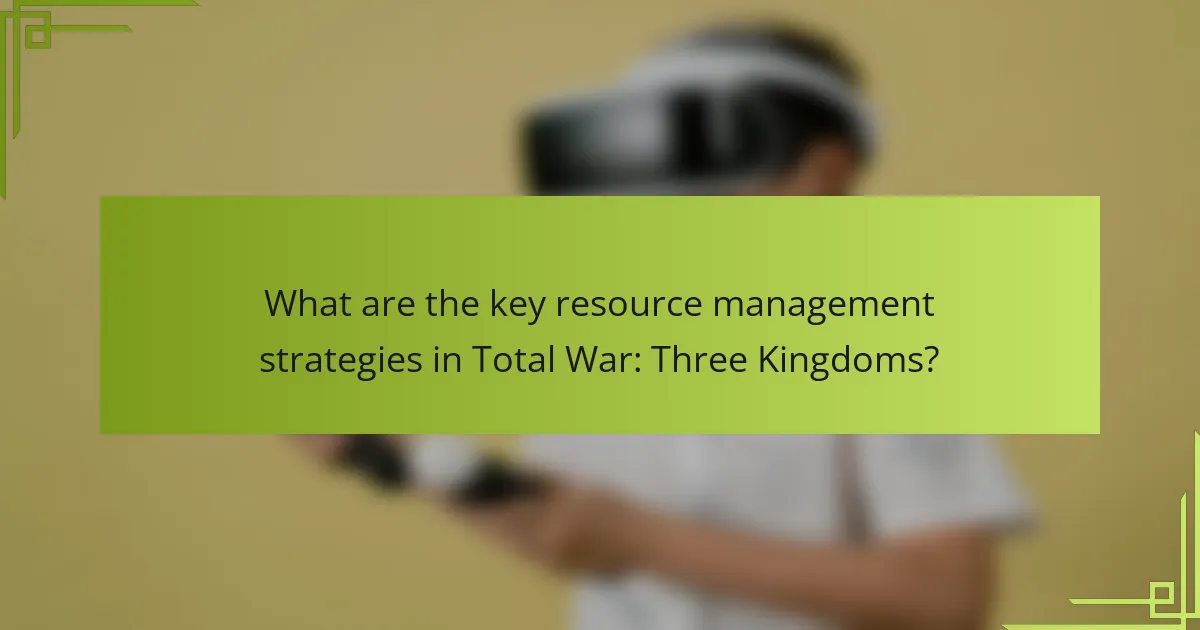Effective resource management in Total War: Three Kingdoms is crucial for forming strong strategic alliances. This article explores optimizing resource allocation, establishing trade agreements, and enhancing diplomatic negotiations. It also examines unique faction strategies and addresses challenges in collaboration. Understanding these elements can significantly improve gameplay and alliance effectiveness.

What are the key resource management strategies in Total War: Three Kingdoms?
Total War: Three Kingdoms employs key resource management strategies that enhance strategic alliances. Effective resource allocation, trade agreements, and diplomatic negotiations are essential for strengthening partnerships.
Resource allocation focuses on optimizing food, income, and military supplies to sustain alliances. Trade agreements facilitate resource exchange, boosting economic growth. Diplomatic negotiations foster political ties, ensuring mutual benefits and stability.
Utilizing these strategies can lead to powerful coalitions, allowing for greater influence in the game. Balancing resources and alliances is crucial for long-term success in Total War: Three Kingdoms.
How does resource allocation impact strategic alliances?
Resource allocation significantly influences the effectiveness of strategic alliances in Total War: Three Kingdoms. Adequate resource distribution fosters collaboration and strengthens partnerships, enhancing military capabilities and economic stability.
Effective resource management involves prioritizing alliances that offer the greatest strategic benefits. For example, allocating resources to allies with strong military units can lead to effective joint campaigns. Additionally, sharing resources can improve trust and communication, vital for successful alliances.
Balancing resource allocation between various factions is crucial. Overcommitting to one alliance may weaken others, creating vulnerabilities. Thus, maintaining a diverse network of alliances ensures resilience and adaptability in changing scenarios.
Strategic alliances thrive on mutual benefits. When resources are allocated wisely, alliances can leverage each other’s strengths, leading to greater overall success in achieving objectives within the game.
Which resources are critical for maintaining alliances?
Critical resources for maintaining alliances in Total War: Three Kingdoms include diplomacy, military support, and resource sharing. Effective communication fosters trust and collaboration. Military assistance strengthens defense and offense capabilities. Resource sharing enhances economic stability, benefiting all parties involved. Additionally, strategic marriages can solidify ties and create mutual benefits.

How do different factions approach resource management?
Different factions in Total War: Three Kingdoms manage resources based on their unique strengths and strategic goals. Each faction prioritizes certain resources to enhance their military and economic capabilities.
The Han faction emphasizes agricultural development, leading to a strong food supply. The Cao Cao faction focuses on trade and diplomacy, optimizing resource acquisition through alliances. The Sun Jian faction leverages naval power, securing coastal resources for trade and military advantages. The Liu Bei faction prioritizes public order and loyalty, investing in infrastructure to ensure stability and resource efficiency.
Understanding these approaches allows players to form strategic alliances that align with their resource management goals, enhancing overall gameplay effectiveness.
What unique resources do specific factions possess?
Specific factions in Total War: Three Kingdoms possess unique resources that enhance their strategic capabilities. For instance, the Han faction benefits from a vast agricultural base, providing food security and troop replenishment. The Cao Cao faction has access to superior cavalry units, improving mobility and battlefield control. The Sun clan excels in naval resources, allowing for effective maritime operations. The Liu Bei faction boasts strong diplomatic ties, facilitating alliances and trade. Each faction’s unique resources significantly influence their gameplay strategies and alliance dynamics.
How do regional characteristics influence resource availability?
Regional characteristics significantly impact resource availability in Total War: Three Kingdoms. Geography, climate, and local economies determine the types and quantities of resources accessible to factions. For instance, fertile lands yield more food, while mountainous regions may offer minerals.
The game emphasizes strategic alliances, as players can leverage regional strengths. Collaborating with factions that control resource-rich areas enhances overall resource management. Unique attributes, such as trade agreements, further optimize resource distribution among allies.
Understanding these dynamics allows players to make informed decisions about expansion and alliances. Effective resource management leads to stronger military capabilities and better chances of victory.

What are the benefits of forming strategic alliances in resource management?
Forming strategic alliances in resource management enhances efficiency, resource sharing, and competitive advantage. Collaborating with other factions allows for optimized resource allocation, reducing waste and costs. Additionally, alliances can lead to increased bargaining power, enabling better access to critical resources and technologies. This synergy fosters innovation and adaptability in a dynamic environment, ultimately strengthening overall performance and sustainability in the game.
How can alliances enhance resource acquisition?
Alliances enhance resource acquisition by pooling strengths and sharing resources among factions. This collaboration leads to increased efficiency and access to diverse resource types. Strategic alliances in Total War: Three Kingdoms enable players to leverage unique attributes of allied factions, such as specialized units or economic advantages. As a result, factions can achieve greater resource sustainability and competitive advantage in the game.
What risks are associated with resource sharing among allies?
Resource sharing among allies in Total War: Three Kingdoms can lead to significant risks, such as resource mismanagement and potential betrayal. Allies may not prioritize shared resources equally, causing tension. Additionally, over-reliance on allies could weaken individual factions, making them vulnerable in conflicts. Unclear communication may result in misunderstandings about resource allocation, leading to strategic disadvantages. Finally, sharing sensitive information can expose allies to espionage, risking the integrity of their alliances.

Which diplomatic actions can strengthen resource-based alliances?
Strengthening resource-based alliances in Total War: Three Kingdoms involves strategic diplomatic actions. Establishing trade agreements enhances resource sharing and mutual benefits. Forming non-aggression pacts fosters trust and stability among allies. Coordinating military support during conflicts reinforces alliances and demonstrates commitment. Engaging in cultural exchanges can improve relations and increase loyalty among factions.
How do trade agreements affect resource flow?
Trade agreements significantly enhance resource flow by establishing favorable conditions for exchange. In “Total War: Three Kingdoms,” strategic alliances leverage these agreements to optimize resource management. These alliances facilitate access to essential resources, reduce costs, and improve trade efficiency. For example, a well-structured trade agreement can increase food production by 20%, enhancing an alliance’s military capabilities. Additionally, alliances can share unique resources, such as rare artifacts, which can provide significant advantages in gameplay. Overall, trade agreements are crucial for maintaining a competitive edge in resource management within the game.
What role does trust play in resource-sharing agreements?
Trust is essential in resource-sharing agreements as it fosters collaboration and reduces conflicts. In “Total War: Three Kingdoms,” strategic alliances thrive on mutual reliance. Trust enhances communication, ensuring resources are shared effectively. It also mitigates risks, as parties are more likely to honor agreements when trust exists. Ultimately, trust strengthens alliances, leading to successful resource management and strategic advantages.

What common challenges arise in resource management during alliances?
Resource management during alliances in Total War: Three Kingdoms often faces challenges like resource allocation, communication barriers, and differing strategic goals. These issues can lead to inefficiencies and conflicts among partners. Effective management requires clear agreements on resource sharing and regular updates to align objectives. Additionally, cultural differences may hinder collaboration, impacting overall performance. Addressing these challenges is essential for successful alliances.
How can players mitigate resource scarcity in alliances?
Players can mitigate resource scarcity in alliances by fostering trade agreements, optimizing resource allocation, and coordinating military efforts. Establishing trade routes increases resource availability, allowing alliances to share surplus materials. Effective resource management ensures that each member contributes strategically, maximizing overall efficiency. Additionally, joint military campaigns can secure resource-rich territories, enhancing the alliance’s sustainability and strength.
What are the consequences of resource mismanagement in alliances?
Resource mismanagement in alliances leads to weakened strategic positions and potential failure. Poor allocation of resources can cause internal conflicts, reduce morale, and hinder growth. For example, imbalanced resource sharing may create resentment among allies, impacting collaboration. Additionally, neglecting resource sustainability can result in long-term disadvantages, such as diminished economic power and weakened military capabilities. These consequences can ultimately destabilize alliances and lead to increased vulnerability against adversaries.

What rare attributes can influence resource management success?
Rare attributes that influence resource management success in Total War: Three Kingdoms include unique faction abilities, environmental factors, and diplomatic relationships. These elements can significantly affect resource allocation and strategic decisions. For example, certain factions may have exclusive access to resources, impacting their economic strength. Additionally, terrain can limit or enhance resource availability, while alliances can provide crucial support in resource sharing and management. Understanding these rare attributes allows players to optimize their strategies effectively.
How does player reputation affect resource negotiations?
Player reputation significantly influences resource negotiations in Total War: Three Kingdoms. High reputation fosters trust, leading to favorable trade agreements and alliances. Conversely, low reputation can result in distrust, limiting negotiation options and increasing resource costs. Players with a strong reputation often secure better terms and access to rare resources. This dynamic is crucial for strategic alliances, as reputation acts as a currency in negotiations, affecting overall gameplay success.
What unique scenarios can create opportunities for resource gain?
Unique scenarios for resource gain in Total War: Three Kingdoms often emerge from strategic alliances, diplomatic negotiations, and battlefield victories. Forming alliances can lead to shared resources and military support, enhancing overall strength. Engaging in trade agreements allows for resource exchange, boosting economic stability. Additionally, exploiting enemy weaknesses during conflicts can capture valuable resources. Utilizing espionage may reveal hidden resource caches, providing a competitive edge. Each scenario emphasizes the importance of strategic planning and adaptability in resource management.

What expert tips can enhance resource management in alliances?
Effective resource management in alliances within Total War: Three Kingdoms hinges on strategic collaboration and communication. Prioritize shared goals to align efforts and optimize resource allocation.
Utilize trade agreements to enhance resource flow and strengthen partnerships. Monitor each faction’s strengths and weaknesses to adjust strategies accordingly.
Regularly assess alliance dynamics to maintain balance and address any conflicts proactively. This fosters trust and encourages cooperative resource strategies.
Leverage espionage to gather intelligence on rivals, ensuring informed decision-making in resource management. This unique approach can provide a significant advantage in competitive scenarios.
What are the best practices for optimizing resource distribution?
To optimize resource distribution in Total War: Three Kingdoms, focus on strategic alliances and efficient management. Establish partnerships that enhance resource sharing and military strength. Prioritize resource-rich regions to support your allies, ensuring balanced contributions. Monitor resource flow and adapt strategies to maintain an advantageous position.
What common mistakes should players avoid in resource management?
Players should avoid common mistakes like neglecting resource balance, ignoring trade opportunities, and underestimating diplomacy. These errors can jeopardize strategic alliances. Prioritize managing food, gold, and materials effectively. Mismanagement leads to weakened positions and conflicts with allies. Focus on clear communication and shared goals to enhance collaboration.